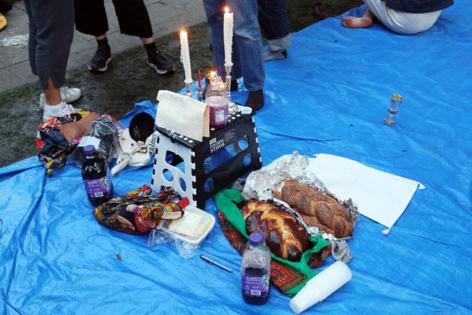At U. of C. encampment, Jewish organizers explain significance of their anti-Zionist Shabbat service
Published in News & Features
After a tense day of protests, counterprotests and increased university police presence on the University of Chicago’s Main Quadrangle, the sun began to fade Friday evening and the Jewish holy day of Sabbath began.
Within the encampment established by the University of Chicago United for Palestine coalition, about 50 Jewish students and faculty and community members sat down on a blue tarp among tents and kaffiyehs to observe a planned prayer service. One challah was decorated with a Palestinian flag in seeds and herbs; the ceremonial “wine” (grape juice) was chosen because it was not made in Israel. Palestinian flags and handmade posters with slogans protesting genocide hung from trees. As they prayed, other students, many of whom were Muslim, held up kaffiyehs, jean shirts and checkered blankets to form a privacy screen.
Since April 29, Jewish anti-Zionist protesters at the Hyde Park campus have used food, ritual and community in the encampment as one of many ways to express their religious commitment to divestment from Israel, a multiethnic future and an end to killings in Gaza. In a practical sense, that means Seders and Shabbats (or Sabbaths), with non-Israeli kosher products, teaching about the pluralistic elements of Jewish traditions like the Moroccan Jewish Mimouna, and eating Palestinian food with Muslims and others in their coalition.
Avi Steinberg, a writer, faculty member and graduate of Orthodox yeshivas who spoke at the event, described Shabbat as a time of reflection.
“People sit with their thoughts and their emotions,” Steinberg said on a phone call Saturday. “It’s a time of stopping the clock completely.”
After the prayer and singing concluded, the Shabbat observers — a small but sizable portion of the broader encampment — dispersed; at the central food tent, a half-dozen or more unflipped maqluba pots sat beside rice and meat already doled out onto steam plates. Cold chopped salads and hot lentil soup were also served. This meal, donated by Arab restaurant Al Bahaar, acted informally as the Shabbat meal. The encampment food tent staff relies on donations of hot food and attempts to keep a variety of vegan, kosher, halal and nonallergenic options available for encampment dwellers.
The Muslim maghrib prayer began soon after on the same blue tarp. The University of Chicago United for Palestine coalition includes Students for Justice in Palestine, UChicago Jews for a Free Palestine, and several other organizations.
Nationally, encampments like this one have been accused of antisemitism. But in interviews with a half-dozen or more Jewish students and affiliated faculty members within the pro-Palestine encampment at the U. of C., none of them said they felt anything resembling antisemitism within the camp. Instead, they said they felt more connected to the Jewish tradition through their activism during the protests. They argued that anti-Zionism and advocating for Palestinian freedom is in a long tradition of Jewish values of pluralism and agitation for justice.
“When we’re praying for peace and human emancipation, to me this is the essence of what it means to be Jewish,” said graduate student Daniel Fernandez, speaking outside the encampment. “What is so profoundly disappointing is that this is somehow controversial.” Fernandez has stayed at the encampment, attending or sometimes leading several of the religious services this past week.
Chicago Jewish leaders held a news conference Wednesday where they called the encampments “platforms for antisemitism.” The university’s major Jewish organizations have disavowed, criticized or ignored the protesters.
...continued
©2024 Chicago Tribune. Visit at chicagotribune.com. Distributed by Tribune Content Agency, LLC.







Comments